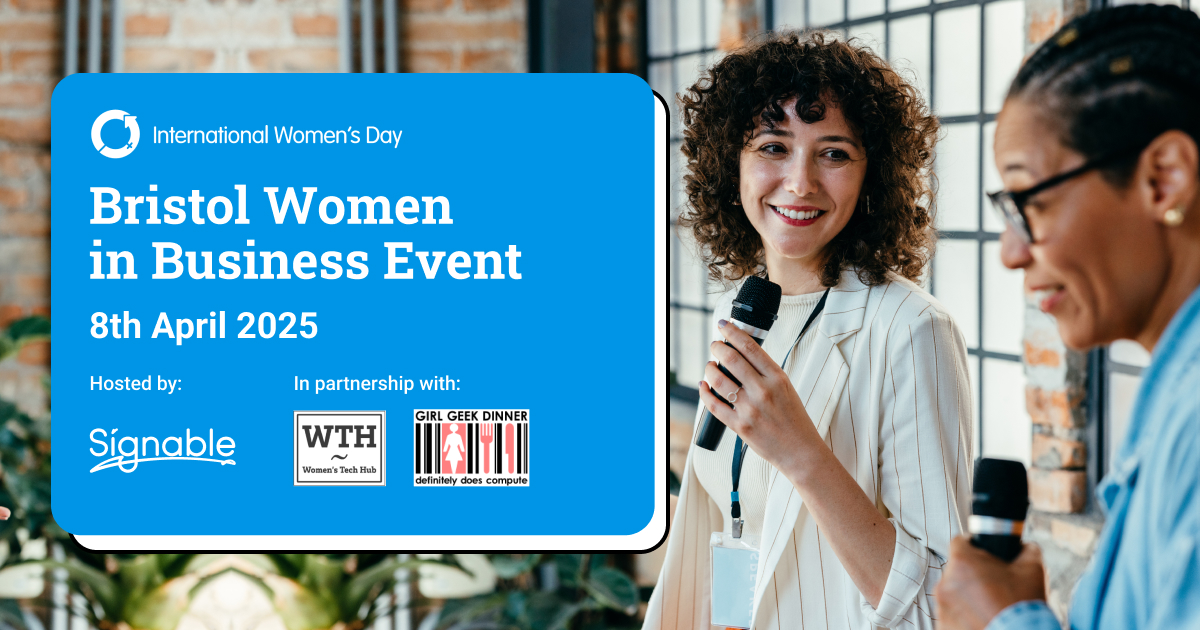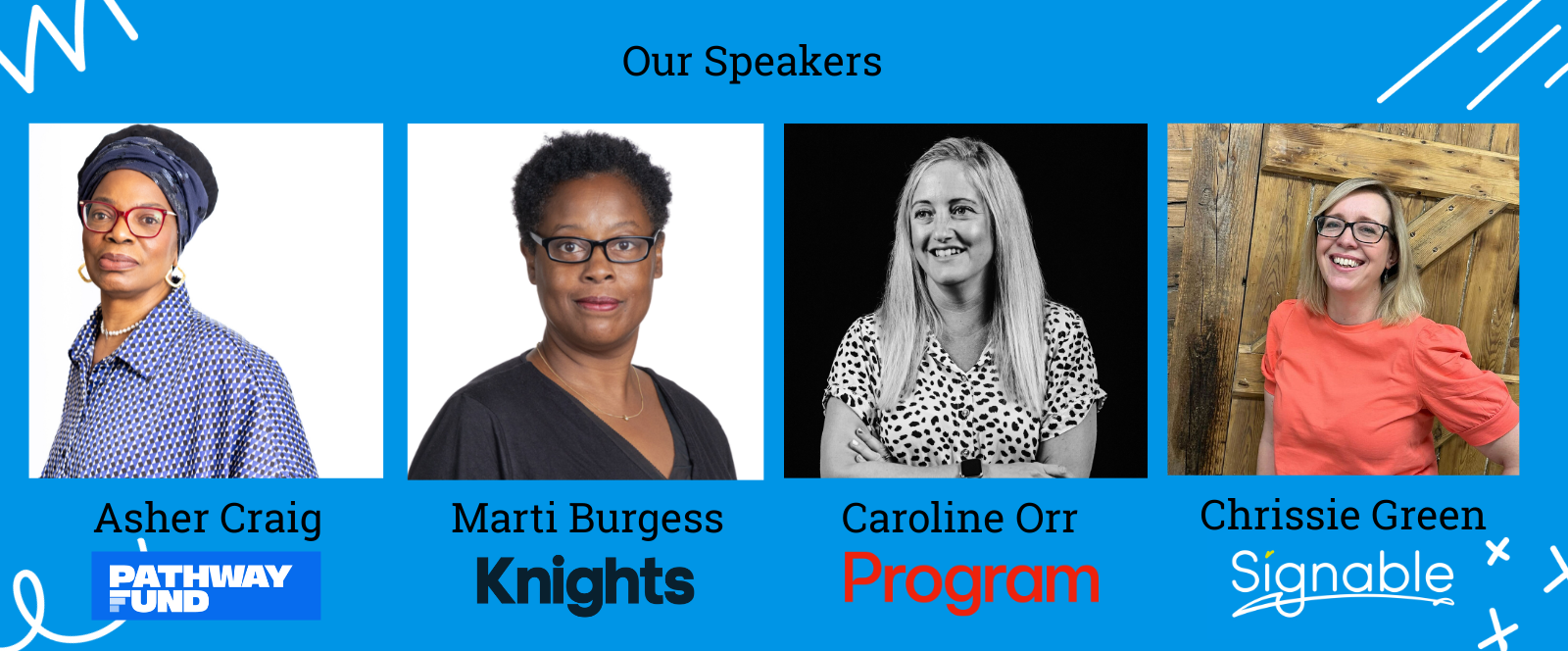Voices from the panel: Bristol Women in Business Event 2025

Published:
Candid career lessons from women who’ve led and learnt along the way
At the Signable 2025 Bristol Women in Business event, we heard the questions that don’t often make it into leadership books or panel scripts. Questions about how to show up authentically, how to move forward when you’re full of doubt, and how to lead when the system wasn’t designed for you.
We’ve taken those questions and turned them into a conversation, one that brings together the lived experiences of four brilliant women:
- Asher Craig, CEO of The Pathway Fund
- Marti Burgess, Partner at Knights
- Caroline Orr, Co-founder of Program & Co-owner of Tech South West
- Chrissie Green, Chief People Officer at Signable

Here’s what they had to say.
Career progression & growth
The idea of a “straight path” is one that none of these women bought into and that honesty was refreshing.
Asher: “My path hasn’t been linear, I’ve stepped sideways, paused, and even backtracked at times. Each detour taught me something valuable. If you’re unsure of your next step, focus less on titles and more on alignment: does this opportunity align with your values, energy, and growth?”
Caroline: “I’ve moved across sectors, said yes to things before I felt ready, and made big changes after becoming a parent. The constant has been staying open to what’s possible, being up for learning, and building relationships with good people.”
Chrissie: “I changed direction twice, from the Air Force, into corporate, and then into consultancy. Not many people have a clear path. It’s okay to shift. Sometimes the riskier move is the one that pays off.”
Top tip: Instead of chasing titles, tune into alignment. Ask yourself: Does this opportunity match my values, energy, and direction? Try journaling or recording a quick voice note to explore what matters to you right now. Remember, growth doesn’t always look like a promotion, it can be a sideways step, a new skill, or a better fit.
Leading without the labels
Leadership looks different for everyone, but for women, it’s often judged through a narrower lens.
Asher: “I’ve been called ‘scary’ – a word often used to dismiss Black women who are simply clear, direct, and assertive. I see myself as formidable, honest, and supportive. Real leadership is about showing up as yourself and earning trust, not demanding respect.”
Chrissie: “Your management style should reflect your values, but it also needs to fit the company you’re in. I’m lucky that Signable’s culture aligns with my own. I lead with fairness, care, and honesty, always asking: is this the right thing to do?”
Marti: “Compassion and decisiveness aren’t opposites. We need to rewrite that narrative because empathy is a leadership strength.”
Top tip: Define your style before someone else labels it. Pick three words you want to be known for, then check in regularly: Are my actions reflecting those? You don’t need a formal title to lead; consistency and clarity speak for themselves.
Confidence and self-doubt
Each speaker had experienced imposter syndrome and had found ways to quiet it.
Asher: “Imposter syndrome shows up when I’m doing something new or high-stakes. What helps is pausing to look at the evidence, remembering what I’ve already overcome and the trust others place in me. Doubt isn’t a stop sign. It’s just a checkpoint.”
Marti: “I think about the women who came before me, both those I know and those in history who had fewer choices and more barriers. Channeling their strength helps put my own doubts into perspective.”
Caroline: “I remind myself that everyone else is still learning and sometimes winging it! Then I reflect on everything I’ve already achieved.”
Chrissie: “I’ve always struggled with it and I’ve been lucky to work in environments that helped. Three things that work for me: surround yourself with people who challenge and build you up, get comfortable being uncomfortable, and take time to celebrate your wins.”
Top tip: Make a “confidence folder.” Save kind messages, wins, feedback, anything that reminds you what you’re capable of. When doubt shows up (and it will), open it. Let the past-you remind the present-you that you’ve handled hard things before.
Shifting the system
There was a consensus that the system needs to change, not just the individuals within it.
Chrissie: “This has to start at the top. People-first culture isn’t an afterthought, it’s baked in from day one. At Signable, Olly (Signable’s CEO) set that intention early. Maternity, flexibility, balance, it all works when leaders believe in it, not just say it.”
Asher: “Real inclusion means women feel safe being themselves and still belong. That means policies, structures, and decision-making power all have to evolve.”
Top Tip: Start where you are. If something feels unfair or outdated, speak up – even if you don’t have the fix. Progress often starts with a quiet “Why is it like this?” Small changes, repeated often, can shift whole systems.
Inclusion and equality
Inclusion isn’t just about bringing more people in. It’s about changing what they find when they get there.
Marti: “Your workplace is inclusive if it reflects the city you’re in. Diversity isn’t just about representation, it makes decision-making better, sparks innovation, and opens new networks. At Knights, we’re proud of how far we’ve come, but there’s still work to do.”
Asher: “It’s not enough to invite women in, the system has to adapt to meet us with equity, not just presence.”
Top Tip: Notice who’s not in the room and ask why. Inclusion isn’t just about bringing more people in, it’s about changing what they find when they get there. Share your space, your voice, and your perspective to help build something fairer.
Final thoughts
None of the women in this conversation claimed to have all the answers and that’s what made their insights so powerful. There was no pretence of perfection, no polished one-size-fits-all approach. Instead, what emerged was something more valuable: a shared understanding that leadership, growth, and belonging are all works in progress.
The path to progression isn’t always clear cut. Leadership doesn’t always look like what we’ve been taught. Confidence often coexists with doubt. And inclusion is more than an initiative, it’s a responsibility.
What ties these women together isn’t just their career success, but their willingness to keep showing up, with honesty, with care, and with the determination to change the system for the better.
“You don’t have to be fearless,” Caroline said. “You just have to keep moving.”
We couldn’t agree more. And maybe that’s the real takeaway, there’s no single path or formula. But hearing how others have navigated the twists, setbacks, and turning points makes it easier to trust your own direction.
Overall, we hope these insights help whether you’re making your next move, finding your voice, or just figuring things out one step at a time. Keep them close, come back to them when you need a nudge, and remember: your path doesn’t have to look like anyone else’s to be valid, valuable, and worth celebrating.
Follow us on LinkedIn to stay up to date with the latest news, stories, and updates from Signable. Keep an eye out for our next event, we’d love to see you there!